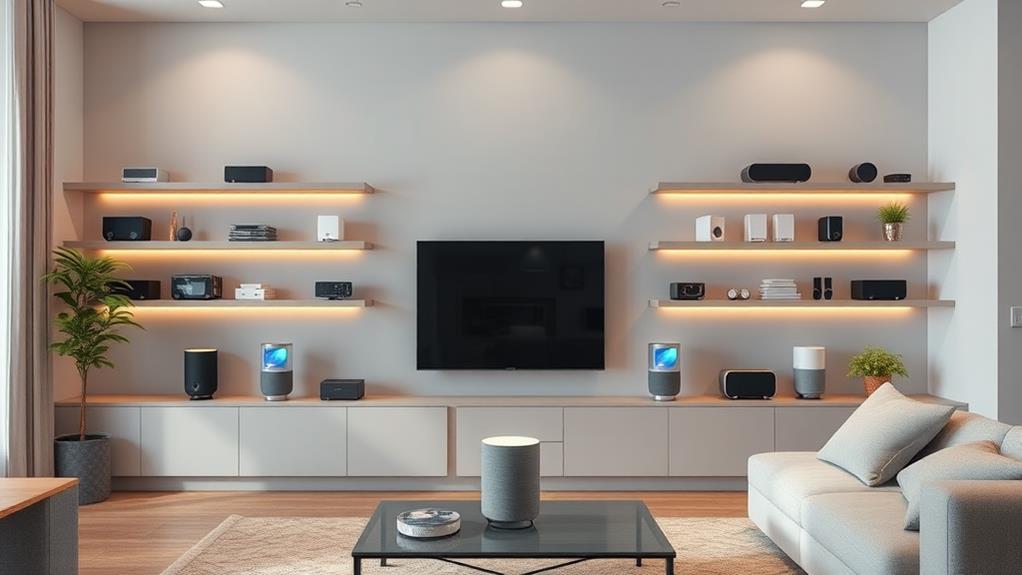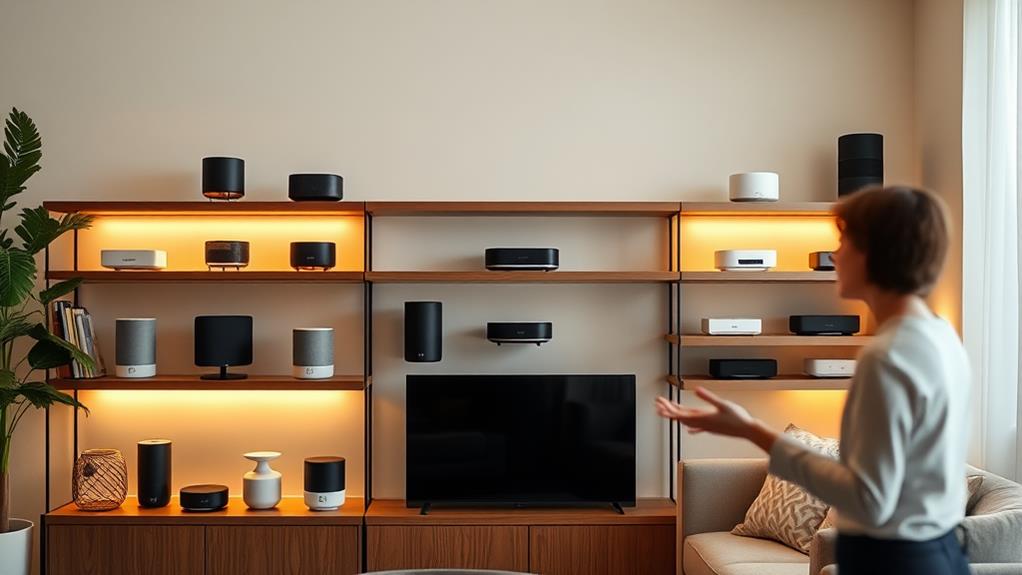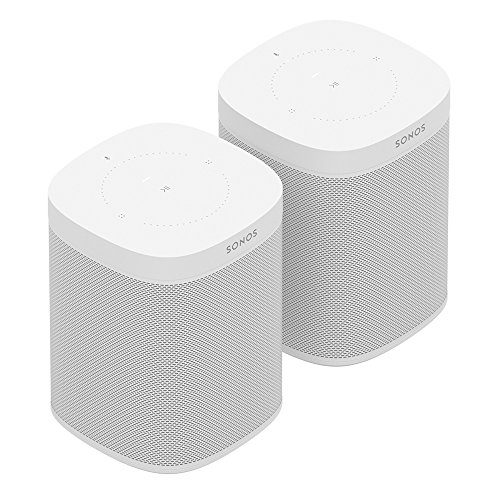Links below are affiliate links. We earn a commission on purchases at no extra cost to you. Although our opinions are based on curated research, we have not used these products. Article generated with AI.
Voice-controlled smart speakers have become essential home devices, offering hands-free convenience and intelligent assistance.
Top options include the Sonos Two Room Set for multi-room audio, the Bose Home Speaker 500, the and Amazon Echo Studio, Each delivers premium sound quality with built-in voice assistants.
When choosing a smart speaker, consider factors like audio quality, smart home integration, voice assistant compatibility, and privacy features.
The following guide explores these top-rated options and key considerations in depth.
Main Points
- Top voice-controlled smart speakers offer advanced audio technologies like Dolby Atmos for immersive sound experiences.
- Multi-room audio capabilities allow synchronized playback across different spaces, enhancing whole-home listening.
- Integration with popular voice assistants like Alexa and Google Assistant enables hands-free control of music and smart home devices.
- Smart speakers often serve as central hubs for smart home ecosystems, supporting various connectivity protocols like Zigbee and Matter.
- Privacy features, including microphone-off buttons and customizable settings, address user concerns about data security and unwanted activations.
Sonos Two-Room Set with All-New One Smart Speaker
Sonos Two-Room Set with All-New One Smart Speaker
Experience the power of sound with the Sonos One (Gen 2) smart speaker. With Alexa integration, rich audio, and multi-room capabilities, it effortlessly enhances your home with music and smart features.
…
Music lovers seeking a seamless multi-room audio experience will find the Sonos Two Room Set with All-New One Smart Speakers an excellent choice.
These compact speakers offer high-quality sound and voice control capabilities. With Amazon Alexa built-in and Google Assistant added in, you can easily manage your music and smart home devices using voice commands.
The speakers connect via Wi-Fi, creating a wireless mesh network that extends throughout your home. You’ll enjoy better sound quality than most wired multi-room systems under $500, and the moisture-proof design allows for temporary outdoor use.
The Sonos app, available for both Android and iOS, provides extensive control over your speakers and music management. With an average customer rating of 4.4 out of 5 stars, these speakers offer a compelling combination of sound quality, convenience, and smart features for your home audio setup.
Best For: Music enthusiasts who want a high-quality, multi-room audio system with smart features and voice control capabilities for their home.
Pros:
- Excellent sound quality surpassing many wired systems under $500
- Easy setup and control through Wi-Fi and the Sonos app
- Voice control with both Amazon Alexa and Google Assistant built-in
Cons:
- Higher price point compared to some single-speaker systems
- Requires at least one component to be wired to the home network
- Limited to 32 speaker groups, which may not be enough for very large setups
Bose Home Speaker 500 with Alexa Voice Control
Bose Home Speaker 500 with Alexa Voice Control
Experience powerful sound with the Bose Home Speaker 500. Enjoy hands-free music control, seamless streaming, and a stunning visual display, all in a sleek, stylish design.
…
Audiophiles seeking a premium smart speaker experience will find the Bose Home Speaker 500 hard to beat. This sleek device boasts impressive wall-to-wall stereo sound from a single unit, filling rooms with rich, full audio.
It’s equipped with both Alexa and Google Assistant, offering hands-free voice control through a noise-rejecting mic system. You’ll enjoy multiple connectivity options, including Bluetooth, Wi-Fi, Apple AirPlay 2, and Spotify Connect.
The speaker’s elegant design features an aluminum finish and an LCD color display showing song information and album art. While some users note less stereo separation than expected, many appreciate the sound quality and smart capabilities.
The Bose Music app allows for easy setup and EQ adjustments, though it may have occasional bugs. Compared to competitors like Sonos One, the Bose 500 delivers louder sound but with slightly less clarity.
Best For: Audiophiles and smart home enthusiasts seeking a premium, feature-rich speaker with excellent sound quality and versatile voice control options.
Pros:
- Impressive wall-to-wall stereo sound from a single speaker
- Multiple connectivity options and voice assistants (Alexa and Google Assistant)
- Elegant design with an LCD color display and aluminum finish
Cons:
- Some users report less stereo separation than expected
- Occasional bugs in the Bose Music app
- Higher price point compared to some competitors
Amazon Echo Studio Smart Speaker with Alexa
Amazon Echo Studio Smart Speaker with Alexa
Experience rich sound with the Amazon Echo Studio! This smart speaker blends immersive audio and Alexa integration, making it the perfect choice for music lovers and smart home enthusiasts.
…
Music enthusiasts seeking superior sound quality in a smart speaker will find the Amazon Echo Studio a compelling choice. This powerful device features Dolby Atmos and spatial audio processing technology, delivering an immersive audio experience through its five-speaker array.
With a 330W peak output and support for various audio formats, including lossless options, the Echo Studio offers exceptional sound clarity and a wide soundstage. It’s compatible with popular music streaming services and can function as a smart home hub for Zigbee and Matter devices.
The built-in Alexa assistant provides voice control for music playback, smart home management, and general queries. While some users reported initial stability issues, software updates have improved performance.
The Echo Studio’s room adaptation feature enhances audio output based on its surroundings, ensuring ideal sound quality in various environments.
Best For: Music enthusiasts and smart homeowners seeking a high-quality, immersive audio experience with advanced features and Alexa integration.
Pros:
- Exceptional sound quality with Dolby Atmos and spatial audio processing
- Versatile smart home hub capabilities for Zigbee and Matter devices
- Automatic room adaptation for optimized audio performance
Cons:
- Requires ample space for optimal sound output
- Initial stability issues reported (though improved with updates)
- Limited compatibility with some operating systems (e.g., no hands-free for Mac OS X)
Bose SoundLink Revolve+ II Portable Bluetooth Speaker
/
Bose SoundLink Revolve+ II Portable Bluetooth Speaker
Experience 360° sound with the SoundLink Revolve+ II. Water-resistant and portable, it offers up to 17 hours of playtime, Alexa integration, and Bluetooth connectivity for any gathering.
…
Audiophiles seeking a portable powerhouse will find their match in the Bose SoundLink Revolve+ II. This Bluetooth speaker delivers 360-degree sound with impressive volume and depth, outperforming its predecessor.
You’ll enjoy up to 17 hours of playtime, perfect for extended outdoor use. The speaker’s IP55 rating guarantees durability against dust and water splashes, while its aluminum body and fabric handle make it easy to transport.
Connectivity is a breeze with voice-guided Bluetooth pairing and multi-device support. You can access voice assistants through the built-in microphone and even pair it with Alexa-enabled devices for hands-free control.
The SoundLink Revolve+ II also offers Party Mode and Stereo Mode for enhanced audio experiences. While the charging cradle is sold separately, users highly recommend it for convenience.
With a 4.7-star rating from over 6,000 reviews, this speaker proves its worth in sound quality, portability, and longevity.
Best For: Music enthusiasts and outdoor adventurers seeking a portable, high-quality speaker with long battery life and durability for various environments.
Pros:
- Exceptional 360-degree sound with deep bass and high volume
- Long-lasting 17-hour battery life for extended use
- Rugged design with IP55 water and dust resistance
Cons:
- The charging cradle is sold separately, adding to the overall cost
- Premium price point compared to some competitors
- Larger size may not be ideal for ultra-light travel
Bluetooth Speakers with RGB Lights and IPX7 Waterproof Rating
Bluetooth Speakers with RGB Lights and IPX7 Waterproof Rating
Experience powerful Hi-Fi stereo sound with 30W dual full-range speakers and a stunning RGB light show. Enjoy 1000 minutes of playtime with waterproof design and immersive 360° surround sound!
…
Music lovers seeking a versatile and durable speaker will find their match in Bluetooth speakers with RGB lights and IPX7 waterproof rating. These compact devices deliver impressive 30W stereo sound through dual full-range drivers, offering clear highs, accurate mids, and deep bass.
With IPX7 waterproofing, they’re suitable for both indoor and outdoor use, from showers to beach trips. The built-in 3600mAh battery provides up to 1000 minutes of playtime, with users reporting around 11.5 hours on a single charge.
The standout feature is the RGB lighting system, which syncs with music beats and offers 7 colors and 6 modes, enhancing the atmosphere for parties. While the sound quality is generally praised, especially considering the price point, some users note inconsistencies in bass performance across different songs.
The speakers also support hands-free calls and voice assistants, making them a versatile choice for various audio needs.
Best For: Music enthusiasts seeking a portable, waterproof speaker with impressive sound quality and party-enhancing RGB lighting for both indoor and outdoor use.
Pros:
- IPX7 waterproof rating ensures durability in various environments
- RGB lighting system with 7 colors and 6 modes syncs with music beats
- Long battery life of up to 1000 minutes (approximately 11.5 hours) on a single charge
Cons:
- Inconsistent bass performance across different songs
- Maximum volume may not be sufficient for noisy outdoor settings
- Small feet design may cause the speaker to roll over easily
Factors to Consider When Choosing Voice-Controlled Smart Speakers for Homes

When choosing a voice-controlled smart speaker for your home in 2024, you’ll need to take into account several key factors.
First, evaluate the compatibility with popular voice assistants like Alexa, Google Assistant, or Siri, as this will determine how you interact with the device.
Additionally, assess the speaker’s sound quality, smart home integration capabilities, privacy features, and ability to sync with other speakers for multi-room audio, as these aspects will greatly influence your overall experience and the speaker’s functionality in your home.
Voice Assistant Compatibility
At the heart of any smart speaker‘s functionality lies its voice assistant compatibility. When choosing a smart speaker for your home, it’s essential to take into account which voice assistants it supports.
Popular options include Amazon Alexa and Google Assistant, each offering unique features and ecosystem integrations. The compatibility of your smart speaker with multiple voice assistants can greatly enhance its versatility and usefulness in your daily life.
Voice assistants enable hands-free control over various functions, from music playback to smart home device management. They can help you set timers, check weather updates, and manage your schedule with simple voice commands.
The effectiveness of voice recognition technology varies between devices, with some offering superior noise-canceling microphones for clearer voice pickup in noisy environments. It’s important to research the specific capabilities of each voice assistant and how well they align with your needs.
Additionally, keep in mind that manufacturers regularly release software updates, which can improve voice assistant capabilities over time. This guarantees that your smart speaker will continue to benefit from the latest features and enhancements in voice recognition and smart home integration long after your initial purchase.
Sound Quality Evaluation
Beyond voice assistant compatibility, sound quality plays a pivotal role in selecting the ideal smart speaker for your home. When examining sound quality, you’ll want to contemplate several key factors.
First, analyze the number and type of drivers in the speaker. More drivers often lead to improved clarity and richer sound across various frequency ranges.
Look for speakers that incorporate advanced audio technologies like Dolby Atmos or spatial audio processing, as these can greatly enhance your listening experience.
Pay attention to the speaker’s power output specifications, particularly peak wattage. Higher wattage typically correlates with the ability to produce louder, clearer sound without distortion.
Some models feature automatic room adaptation technology, which optimizes sound playback based on your specific environment. This can be particularly beneficial if you’re placing the speaker in a uniquely shaped or furnished room.
Don’t overlook user feedback when evaluating audio performance. Real-world experiences, especially regarding bass response and clarity at high volumes, can provide valuable insights.
By considering these factors, you’ll be better equipped to choose a voice-controlled smart speaker that delivers exceptional sound quality for your home.
Smart Home Integration
Smart home integration stands as an essential factor when selecting voice-controlled smart speakers. These devices serve as centralized hubs for your smart home ecosystem, allowing you to control various devices through simple voice commands.
When choosing a smart speaker, consider its compatibility with multiple smart home platforms, as this will enable you to manage devices from different manufacturers using a single interface. Look for models that offer regular software updates, as these can expand the speaker’s capabilities and improve integration with new devices and protocols over time.
Advanced smart speakers often include built-in sensors that automatically adjust settings based on your preferences or environmental conditions, enhancing both convenience and energy efficiency.
You’ll want to evaluate the speaker’s ability to create routines or schedules through voice commands, as this feature can greatly streamline your daily tasks and improve overall smart home functionality.
By selecting a voice-controlled smart speaker with robust smart home integration features, you’ll be able to create a more seamless and efficient living environment, where lighting, thermostats, and security systems work together harmoniously under your vocal direction.
Privacy and Security Features
Safeguarding your privacy and security should be a top priority when selecting a voice-controlled smart speaker for your home. Modern smart speakers come equipped with multiple layers of privacy controls to enhance your security.
You’ll find features like microphone off buttons and voice recording management options, giving you control over your device’s listening capabilities.
Most smart speakers use wake word technology, which means they only activate when they hear a specific phrase. This reduces the chances of unintended activation and helps protect your privacy.
Manufacturers typically provide regular software security updates for several years after purchase, ensuring your device stays protected against new threats.
You’ll also have the ability to customize privacy settings through companion apps, allowing you to manage data sharing and voice recordings. It’s worth noting that reputable manufacturers generally don’t sell personal information to third parties, contributing to a safer user experience.
When choosing a smart speaker, look for devices that offer these privacy and security features, as they’ll help you maintain control over your personal information while enjoying the convenience of voice-controlled technology in your home.
Multi-Room Audio Capabilities
If you’re looking to fill your entire home with synchronized audio, multi-room capabilities are an essential feature to contemplate when choosing a voice-controlled smart speaker. This functionality allows you to stream music seamlessly across multiple speakers in different rooms, creating an immersive listening experience throughout your living space.
Many smart speakers support the creation of speaker groups, enabling you to control music playback in designated areas without additional hardware.
Wireless mesh systems often underpin these multi-room setups, with each speaker acting as both a client and a repeater. This extends the connectivity range and enhances audio quality across your home.
Integration with voice assistants like Amazon Alexa or Google Assistant provides effortless control over your multi-room audio system through simple voice commands. You’ll typically manage your setup via a dedicated mobile app, which allows for easy adjustments and smooth shifts between audio sources.
When selecting a smart speaker for multi-room audio, consider its compatibility with other devices, the strength of its wireless connectivity, and the intuitiveness of its companion app. These factors will guarantee you get the most out of your home audio experience.
Design and Aesthetics
Aesthetics play an essential role in selecting voice-controlled smart speakers for your home in 2024. Modern designs often feature sleek, contemporary aesthetics that complement various decor styles.
You’ll find options with aluminum finishes, tapered cylindrical shapes, and compact dimensions, allowing for easy integration into any room. When choosing a smart speaker, consider its visual impact and how it fits with your home’s overall look.
Many smart speakers are designed for portability, with lightweight construction that enables you to move them around your home or take them outdoors. This versatility enhances their usability and allows you to enjoy your music or voice assistant in different settings.
Durability is another key factor, with some models offering water and dust resistance ratings like IPX7, making them suitable for use in kitchens or outdoor environments. User-friendly designs often incorporate intuitive controls, such as touch-sensitive surfaces or voice prompts for easy pairing and operation.
Some smart speakers even feature customizable RGB lighting options that synchronize with music, allowing you to create an engaging atmosphere in your living spaces.
Connectivity Options
When choosing a voice-controlled smart speaker, you’ll want to pay close attention to its connectivity options. Wi-Fi connectivity is a standard feature, allowing your speaker to integrate seamlessly with your home network and control other smart devices. This is crucial for accessing internet-based services and maintaining a stable connection throughout your home.
Bluetooth support is another key feature to take into account, as it enables easy audio streaming from your smartphones and tablets. Some models also include auxiliary inputs, such as 3.5mm jacks, which allow you to connect non-wireless audio sources directly to the speaker.
For those with more advanced smart home setups, look for speakers that support protocols like Zigbee or Matter, as these enhance compatibility with a wider range of devices.
Multi-room audio capabilities are worth evaluating if you’re planning to use multiple speakers throughout your home. This feature allows you to group speakers for synchronized playback across different rooms, creating a cohesive audio experience.
By carefully assessing these connectivity options, you can ascertain that your chosen smart speaker will integrate smoothly with your existing devices and meet your specific needs.
Price and Value
Price and value stand out as critical factors in the selection of voice-controlled smart speakers for your home. When exploring your options, you’ll find a wide range of prices, typically between $100 and $400, accommodating various budgets and feature sets.
To make an informed decision, it is important to evaluate the overall value proposition of each speaker.
Consider the built-in voice assistants, sound quality, and compatibility with other smart home devices, as these features can justify a higher price point. Look for models offering additional functionalities, such as multi-room audio or thorough smart home integration, which can enhance your user experience and provide better long-term value.
It is also wise to factor in the potential for software updates, as these can improve features and security over time, extending the speaker’s usability beyond its initial purchase.
Don’t overlook customer ratings and reviews when comparing models. Higher-rated products often deliver superior sound quality and user satisfaction, indicating a better return on investment.
By carefully weighing these factors, you can select a voice-controlled smart speaker that offers the best balance of price and value for your specific needs.
Frequently Asked Questions
How Do Voice-Controlled Smart Speakers Handle Multiple User Profiles in a Household?
Like a digital butler recognizing different family members, voice-controlled smart speakers handle multiple user profiles through voice recognition technology. You’ll set up individual profiles during the initial device configuration.
The speaker learns to distinguish voices, enabling personalized responses and access to user-specific content like calendars or playlists. Some systems allow for multiple accounts to be linked, while others use a primary account with shared access.
Privacy settings can be customized for each user, ensuring personal data remains separate and secure within the household.
Can Smart Speakers Be Used as Intercoms Between Different Rooms?
Yes, you can use many smart speakers as intercoms between rooms in your home. This feature, often called “drop-in” or “broadcasting,” allows you to send voice messages to other compatible devices. You’ll typically need multiple speakers of the same brand for this to work.
To use the intercom function, you’ll generally say a command like “Broadcast” or “Drop in on [room name],” followed by your message. It’s a convenient way to communicate throughout your house without shouting or walking to each room.
Are There Privacy Concerns With Always-On Voice-Activated Smart Speakers?
You’re right to be concerned—smart speakers are essentially tiny spies in your home! Privacy issues with always-on devices are significant. They’re constantly listening for wake words, which means they could potentially capture sensitive conversations.
Data collection, hacking risks, and unauthorized access are real concerns. Companies may use your voice data for targeted advertising or share it with third parties. To mitigate risks, you can review privacy settings, mute the microphone when not in use, and regularly delete your voice history.
How Do Smart Speakers Integrate With Existing Home Automation Systems?
Smart speakers can easily integrate with your existing home automation systems through compatible protocols and apps. You’ll typically connect your smart speaker to your home’s Wi-Fi network, then use its companion app to link it with other smart devices.
Many speakers support popular standards like Zigbee or Z-Wave, allowing them to control lights, thermostats, and security systems. You can create custom voice commands to trigger specific actions or scenes in your smart home ecosystem, streamlining your daily routines and enhancing overall convenience.
What Happens to Smart Speaker Functionality During Internet Outages?
During internet outages, your smart speaker’s functionality falters. Features requiring cloud connectivity, like web searches or streaming services, won’t work. However, you’ll still have access to basic functions that don’t need internet.
You can use voice commands for local tasks, such as setting alarms, timers, or controlling offline-compatible smart home devices. Some speakers cache frequently used information, allowing limited responses to common queries.
Remember, your speaker’s capabilities during outages depend on its specific model and built-in offline features.









